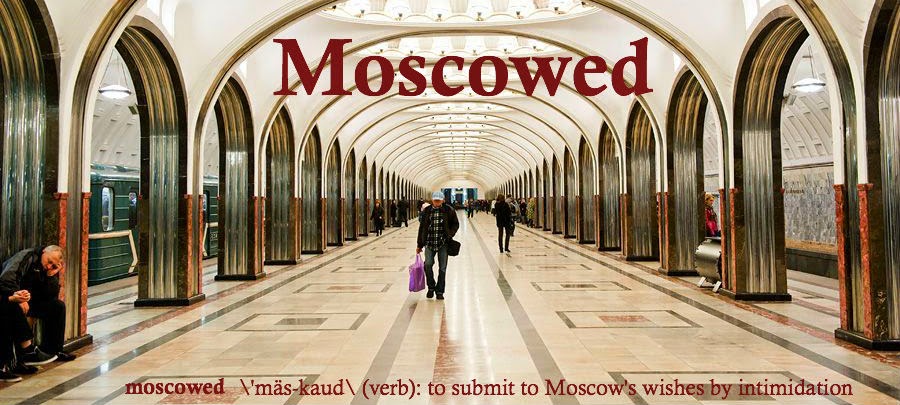While I haven’t found myself missing home yet, I couldn’t say no to a Halloween party at the US Embassy in the company of my fellow Americans. Since costumes did not make the cut when I was packing for ten months in Russia, I was sorely lacking in Halloween attire. Luckily, Molly came to the rescue with a topical yet easy idea: Edward Snowden. I was worried that no one would understand my slipshod Snowden costume, but when I crossed paths with Olga on the street outside my flat, she didn’t even recognize me. I’m clearly a master of disguise.
Molly had put far more effort into her costume, which was a murderous version of Taylor Swift, complete with the names of her ex-boyfriends written in blood. I made her reassure me that I didn’t look like an androgynous PE teacher with my manly shirt and the whistle around my neck (because Ed’s a whistleblower, get it?). Luckily, Molly helped dispel confusion by fashioning a Manila folder emblazoned with the words “Classified” and “NSA” and we were on our way.
Before entering the Embassy compound, one has to pass a trio of Russian police officers, relinquish their passport, hand over all electronics, go through metal detectors, and get patted down. In the company of an escort (in this case, a friend), you’re allowed to pass go and proceed to the Marine bar. And then, you’re basically in America.
Because the Marines’ primary responsibility is protecting the Embassy, mixology is not their forte. So when I ordered Long Island Iced Teas, a young pirate manning the bar shrugged apologetically and said, “I don’t know what’s in that.”
“Everything,” Molly answered. It was a recipe that would haunt us when we saw our drinks glowing under black lights a few minutes later.
While we waited for our tea, the pirate tried to guess who/what we were. I was relieved to discover that my costume was “funny” and not “deportation-worthy,” and his initial belief that Molly was Alex from A Clockwork Orange may have inspired our costumes for a Halloween redux this weekend. Drinks in hand, we hit up the dance floor, chatted with Americans, and ate Nacho Cheese Doritos like they were our national cuisine.
Even though I’m not proud of that last bit, it was oddly comforting to be unapologetically American for a night. While that’s mostly due to the fact that my IQ plummets as soon as I have to start declining nouns, it’s also nice to have an innate understanding of cultural norms, which is something I will probably only have in the company of Americans. However, it was quite clear I had returned to Russia as I crossed the darkened Moscow River on my walk home, dodging traffic and wayward hooligans (good thing my Edward Snowden whistle doubles as a rape whistle). For all the comforts of America, I am unabashedly in love with Moscow and nowhere near ready to head home yet.
Molly had put far more effort into her costume, which was a murderous version of Taylor Swift, complete with the names of her ex-boyfriends written in blood. I made her reassure me that I didn’t look like an androgynous PE teacher with my manly shirt and the whistle around my neck (because Ed’s a whistleblower, get it?). Luckily, Molly helped dispel confusion by fashioning a Manila folder emblazoned with the words “Classified” and “NSA” and we were on our way.
Before entering the Embassy compound, one has to pass a trio of Russian police officers, relinquish their passport, hand over all electronics, go through metal detectors, and get patted down. In the company of an escort (in this case, a friend), you’re allowed to pass go and proceed to the Marine bar. And then, you’re basically in America.
Because the Marines’ primary responsibility is protecting the Embassy, mixology is not their forte. So when I ordered Long Island Iced Teas, a young pirate manning the bar shrugged apologetically and said, “I don’t know what’s in that.”
“Everything,” Molly answered. It was a recipe that would haunt us when we saw our drinks glowing under black lights a few minutes later.
While we waited for our tea, the pirate tried to guess who/what we were. I was relieved to discover that my costume was “funny” and not “deportation-worthy,” and his initial belief that Molly was Alex from A Clockwork Orange may have inspired our costumes for a Halloween redux this weekend. Drinks in hand, we hit up the dance floor, chatted with Americans, and ate Nacho Cheese Doritos like they were our national cuisine.
Even though I’m not proud of that last bit, it was oddly comforting to be unapologetically American for a night. While that’s mostly due to the fact that my IQ plummets as soon as I have to start declining nouns, it’s also nice to have an innate understanding of cultural norms, which is something I will probably only have in the company of Americans. However, it was quite clear I had returned to Russia as I crossed the darkened Moscow River on my walk home, dodging traffic and wayward hooligans (good thing my Edward Snowden whistle doubles as a rape whistle). For all the comforts of America, I am unabashedly in love with Moscow and nowhere near ready to head home yet.









